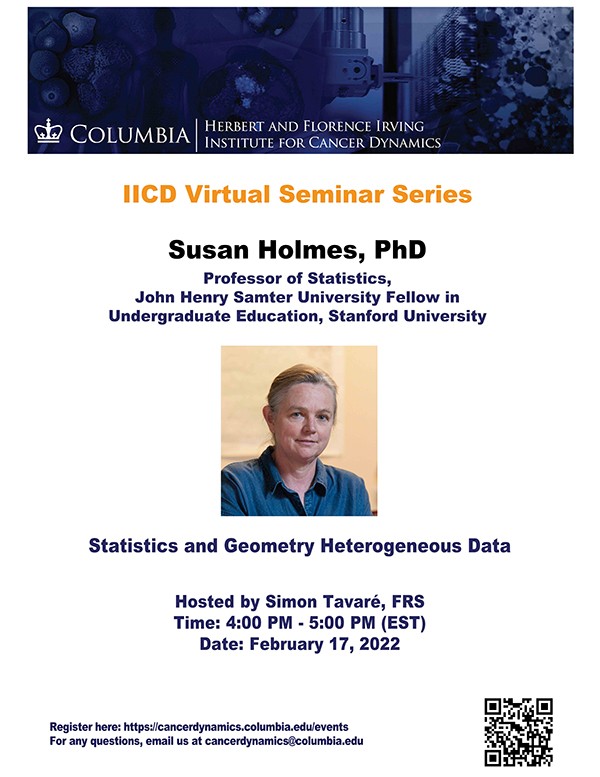The Herbert and Florence Irving Institute for Cancer Dynamics hosts a seminar series on the topic of mathematical sciences underpinning cancer research. The monthly seminars take place on the third Thursday of the month, 4:00-5:00 PM EST. The presentations are held via Zoom and are opened to the Columbia community and to researchers outside Columbia University.
On Thursday, February 17th (4:00-5:00 PM, EST), IICD welcomes Susan Holmes, PhD, The John Henry Samter University Fellow in Undergraduate Education and Professor of Statistics, Department of Statistics, Stanford University.
To attend the seminar, please register here: https://columbiauniversity.zoom.us/meeting/register/tJAtcuuvrz4tGN3US0uqg2ogLBNoB9x7-M_v
Title: Statistics and Geometry for Heterogeneous Data
Abstract: Today's challenges in immunology and microbiology center around the quantification of uncertainty and the design of experiments for heterogeneous multimodal data. We often have tens of thousands of features and only a few hundred samples. We need to create embeddings for graphs, trees and other non-Euclidean objects. Using the sample/feature duality in the data can often provide effective low dimensional representations. However, some of the nonlinearities in the underlying factors and non-uniformity in the sampling pose extra challenges. Using local methods inspired by differential geometry, special maps and transformations can enable us to construct accompanying uncertainty contours even for data on curved manifolds. This talk gives examples where we have built software and geometrical tools that provide consensus spaces where we can build the uncertainty maps that we need when designing follow-up experiments.
Bio: Susan Holmes has been working in non-parametric multivariate statistics applied to Biology since 1985. She started her research career in France at the INRA institute in Montpellier. She has taught at MIT, Harvard and was an Associate Professor of Biometry at Cornell before moving to Stanford in 1998. She likes working on big messy data sets, mostly from the areas of Immunology, Cancer Biology and Microbial Ecology and her group developed the popular Bioconductor packages phyloseq and dada2 for microbiome data analyses. Professor Holmes co-authored an open access book with Wolfgang Huber (EMBL) published by Cambridge University Press on Modern Statistics for Modern Biology based on a popular course she teaches at Stanford. Her theoretical interests include applied probability, MCMC (Monte Carlo Markov chains), Graph Limit Theory, Differential Geometry, and the topology of the space of Phylogenetic Trees. Her honors and awards include CASBS Fellow, Center for the Advanced study of the Behavioral Sciences (2017-2018); Breiman Lecturer, NeurIPS (December 2016); Fellow, Fields Institute in Mathematical Sciences, Toronto, Canada (2015); Director's Transformative Research Award, NIH (2013); John Henry Samter University Fellow in Undergraduate Education, Stanford (2012) and she has been a Fellow and Council member of the Institute of Mathematical Statistics (IMS).

